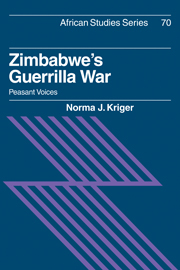Book contents
- Frontmatter
- Contents
- List of maps
- Acknowledgements
- Introduction
- 1 Peasant revolutions: theories and methods
- 2 Inequalities and peasant grievances
- 3 Strategies, goals and appeals: continuity and change
- 4 Guerrilla–civilian relations: the issue of popular support
- 5 Struggles in the struggle
- 6 Legacies of the war for peasants
- 7 Conclusion
- Appendix: Field research
- Notes
- Bibliography
- Index
- Other books in the series
2 - Inequalities and peasant grievances
Published online by Cambridge University Press: 05 January 2012
- Frontmatter
- Contents
- List of maps
- Acknowledgements
- Introduction
- 1 Peasant revolutions: theories and methods
- 2 Inequalities and peasant grievances
- 3 Strategies, goals and appeals: continuity and change
- 4 Guerrilla–civilian relations: the issue of popular support
- 5 Struggles in the struggle
- 6 Legacies of the war for peasants
- 7 Conclusion
- Appendix: Field research
- Notes
- Bibliography
- Index
- Other books in the series
Summary
The grievances of rural Africans against the white minority regime are a necessary backdrop to this study as they form the basis for the appeals used by the guerrillas to mobilize and unite rural Africans (see chapter 3). However, a central argument of this book is that peasant resentments against inequalities with other Africans provided even more powerful drives to participate in the nationalist guerrilla war than did peasant hostility to colonial policies and whites. These inter-African inequalities within the peasantry are also potential grievances available to a revolutionary movement that seeks to mobilize peasants. Chapter 1 discussed how the concepts of nationalism and peasants, reliance on non-peasant sources, and an elite bias in the literature on peasant revolutions contribute to bypassing grievances emanating from internal peasant organization. The purpose of this chapter is to rectify that neglect without excluding racially discriminatory colonial policies that produced anti-white and anti-colonial grievances. Elite–mass or incipient class tensions among rural Africans are given more weight than they ordinarily receive in accounts of grievances underlying Zimbabwe's anti-colonial nationalist movements. Where possible, the study of racial inequalities and African rural inequalities will draw on Mutoko district data.
A definition of who to include in the peasant category in the Zimbabwean context is necessary. Commonly, Tribal Trust Land cultivators and Purchase Area farmers are lumped together as peasants. Even teachers, businessmen, and storekeepers are sometimes included in the peasant category.
- Type
- Chapter
- Information
- Zimbabwe's Guerrilla WarPeasant Voices, pp. 51 - 81Publisher: Cambridge University PressPrint publication year: 1991



